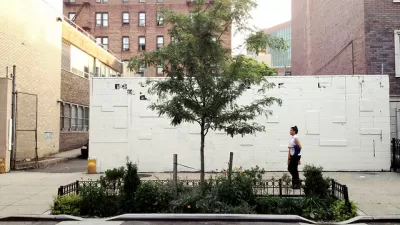Nate Berg looks at a new study analyzing the cost benefits of large-scale green infrastructure projects, which demonstrates that governments are wasting billions of dollars a year by not going green.
While large-scale green infrastructure projects such as roof gardens or permeable streets are often characterized as being hugely expensive, a new study, co-authored by the American Society of Landscape Architects, American Rivers, the Water Environment Federation, and ECONorthwest, set out to compare the costs of such projects with traditional infrastructure projects.
According to Berg, in "Looking at 479 case studies of green infrastructure projects around the U.S., the report finds that the majority of projects turned out to be just as affordable or even more so than traditional "grey" infrastructure. About a quarter of projects raised costs, 31 percent, kept costs the same and more than 44 percent actually brought costs down."
Paying particular attention to the benefits of green infrastructure projects to cities with combined sewer systems, the study found significant cost savings for early adopter communities. Furthermore, as Berg notes, "by allowing natural processes to take over the work we've been building infrastructure to handle, operations and maintenance costs also fall. The report concedes that some maintenance on green infrastructure will still be required, but that it is significantly less than what's required by traditional infrastructure."
FULL STORY: Green Infrastructure Could Save Cities Billions

Coming Soon to Ohio: The Largest Agrivoltaic Farm in the US
The ambitious 6,000-acre project will combine an 800-watt solar farm with crop and livestock production.

Pennsylvania Mall Conversion Bill Passes House
If passed, the bill would promote the adaptive reuse of defunct commercial buildings.

U.S. Supreme Court: California's Impact Fees May Violate Takings Clause
A California property owner took El Dorado County to state court after paying a traffic impact fee he felt was exorbitant. He lost in trial court, appellate court, and the California Supreme Court denied review. Then the U.S. Supreme Court acted.

Dallas Surburb Bans New Airbnbs
Plano’s city council banned all new permits for short-term rentals as concerns about their impacts on housing costs grow.

Divvy Introduces E-Bike Charging Docks
New, circular docks let e-bikes charge at stations, eliminating the need for frequent battery swaps.

How Freeway Projects Impact Climate Resilience
In addition to displacement and public health impacts, highway expansions can also make communities less resilient to flooding and other climate-related disasters.
City of Costa Mesa
Licking County
Barrett Planning Group LLC
HUD's Office of Policy Development and Research
Mpact Transit + Community
HUD's Office of Policy Development and Research
Tufts University, Department of Urban and Environmental Policy & Planning
City of Universal City TX
ULI Northwest Arkansas
Urban Design for Planners 1: Software Tools
This six-course series explores essential urban design concepts using open source software and equips planners with the tools they need to participate fully in the urban design process.
Planning for Universal Design
Learn the tools for implementing Universal Design in planning regulations.
























